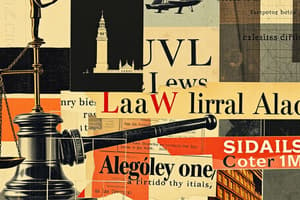Podcast
Questions and Answers
What does 'standing to sue' mean?
What does 'standing to sue' mean?
The requirement that plaintiffs have a serious interest in a case, depending on whether they have sustained or are likely to sustain a direct and substantial injury from another party or governmental action.
What are class action suits?
What are class action suits?
Lawsuits in which a small number of people sue on behalf of all individuals in similar circumstances.
What are justiciable disputes?
What are justiciable disputes?
Issues capable of being settled as a matter of law.
What are amicus curiae briefs?
What are amicus curiae briefs?
What is original jurisdiction?
What is original jurisdiction?
What is appellate jurisdiction?
What is appellate jurisdiction?
What are district courts?
What are district courts?
What are courts of appeal?
What are courts of appeal?
What is the Supreme Court?
What is the Supreme Court?
What is senatorial courtesy?
What is senatorial courtesy?
What is a solicitor general?
What is a solicitor general?
What is an opinion in the judicial context?
What is an opinion in the judicial context?
What does 'stare decisis' mean?
What does 'stare decisis' mean?
What is precedent?
What is precedent?
What is judicial implementation?
What is judicial implementation?
What is original intent?
What is original intent?
What is judicial review?
What is judicial review?
What is judicial restraint?
What is judicial restraint?
What is judicial activism?
What is judicial activism?
What are political questions?
What are political questions?
What is statutory construction?
What is statutory construction?
What does 'per curiam' mean?
What does 'per curiam' mean?
Flashcards
Standing to Sue
Standing to Sue
The requirement for plaintiffs to demonstrate a direct and substantial injury to have the right to sue.
Class Action Suits
Class Action Suits
Lawsuits filed by a few individuals on behalf of a larger group with similar grievances.
Justiciable Disputes
Justiciable Disputes
Legal issues that are appropriate and ready for judicial resolution.
Amicus Curiae Briefs
Amicus Curiae Briefs
Signup and view all the flashcards
Original Jurisdiction
Original Jurisdiction
Signup and view all the flashcards
Appellate Jurisdiction
Appellate Jurisdiction
Signup and view all the flashcards
District Courts
District Courts
Signup and view all the flashcards
Courts of Appeal
Courts of Appeal
Signup and view all the flashcards
Supreme Court
Supreme Court
Signup and view all the flashcards
Senatorial Courtesy
Senatorial Courtesy
Signup and view all the flashcards
Solicitor General
Solicitor General
Signup and view all the flashcards
Opinion
Opinion
Signup and view all the flashcards
Stare Decisis
Stare Decisis
Signup and view all the flashcards
Precedent
Precedent
Signup and view all the flashcards
Judicial Implementation
Judicial Implementation
Signup and view all the flashcards
Original Intent
Original Intent
Signup and view all the flashcards
Judicial Review
Judicial Review
Signup and view all the flashcards
Judicial Restraint
Judicial Restraint
Signup and view all the flashcards
Judicial Activism
Judicial Activism
Signup and view all the flashcards
Political Questions
Political Questions
Signup and view all the flashcards
Statutory Construction
Statutory Construction
Signup and view all the flashcards
Per Curiam
Per Curiam
Signup and view all the flashcards
Study Notes
Legal Concepts and Terminology
- Standing to sue: Requires plaintiffs to show a serious interest in a case based on direct, substantial injury from another party or government action.
- Class action suits: Lawsuits filed by a few individuals representing a larger group facing similar legal issues.
- Justiciable disputes: Legal issues that can be resolved through the judicial system.
Court Processes and Jurisdictions
- Amicus curiae briefs: Submissions by non-parties ("friends of the court") aiming to influence court decisions with additional viewpoints and information.
- Original jurisdiction: The authority of courts to hear a case first, focusing on determining facts.
- Appellate jurisdiction: Courts that review appeals from lower courts, concentrating on legal issues rather than factual records.
Structure of the Federal Court System
- District courts: 91 federal courts of original jurisdiction where trials occur and juries may be involved.
- Courts of appeal: Appellate courts that review final district court decisions and some regulatory agency orders.
- Supreme Court: The highest court, ensuring uniformity in law interpretation and resolving state conflicts. Holds both original and appellate jurisdiction.
Judicial Nominations and Processes
- Senatorial courtesy: Unwritten tradition of not confirming state-level federal judicial nominees opposed by a senator from the president's party representing that state.
- Solicitor general: A presidential appointee responsible for managing appellate litigation for the federal government.
Legal Reasoning and Precedent
- Opinion: A legal reasoning statement accompanying a judicial decision, often carrying significant weight.
- Stare decisis: A principle of adhering to established precedents in judicial decision-making.
- Precedent: Previous decisions serving as a guide for lower courts in similar cases.
Implementing Judicial Decisions
- Judicial implementation: Refers to how court rulings are translated into policy and enforced by other government entities.
Theories of Constitutional Interpretation
- Original intent: The belief that the Constitution should be interpreted based on the Framers' original intentions, favored by some conservatives.
- Judicial review: The judiciary's authority to assess the constitutional validity of legislative and executive actions, established by Marbury v. Madison.
- Judicial restraint: Philosophy advocating minimal judicial involvement in policymaking, deferring to legislative authority.
- Judicial activism: Encourages judges to make proactive policy decisions and address unfulfilled needs in society through court rulings.
Other Legal Considerations
- Political questions: A judicial doctrine for avoiding cases involving political disputes between Congress and the president.
- Statutory construction: The interpretation of Congressional legislation by the judiciary, occasionally leading to new clarifications and law enactments.
- Per curiam: A decision delivered in the name of the Court, rather than by a specific justice.
Studying That Suits You
Use AI to generate personalized quizzes and flashcards to suit your learning preferences.




